It is deer hunting season on Martha’s Vineyard. The eight-week archery season, which began October seventh across the Cape and islands, is a favorite time of my outdoor calendar.
Over the years, I have come to appreciate much about the fall hunting experience. And some stuff, not so much.
The temperature is comfortable, summer crowds have departed and seasonal properties are unoccupied, save by the deer that move about freely feeding on tasty shrubbery, flowers and gardens.
The arrival of a new hunting season does mean I’m one year older — now nearing seventy.
As I’ve aged and body aches have become the new normal, I’ve gained a new appreciation for those parts of my body that still function pretty well.
And I like to brag to my daughter. “How many guys my age do you know putting up tree stands?” That elicits the eye-roll that exasperated me when she was a teenager, but now delights me.
There are many strategic factors to consider when selecting a spot to erect a treestand. Scouting a property is part of the hunting skill set.
One challenge is to determine the pathways deer take through a particular property. Then find a nearby tree that has grown reasonably straight and has sufficient branches to break up your silhouette. I enjoy matching wits with nature.
I hunt primarily in the up-Island town of Chilmark. Gnarly oaks, thick brush and greenbriars predominate. The tree stand puts me above this tangle of vegetation and provides a good vantage point from which to watch all sorts of critters while I wait for a deer to appear.
My favorite is when I catch a glimpse of a hawk weaving through the tree branches at breakneck speed. How this avian hunter manages to avoid a collision is a marvel. Squirrels chasing each other around trees also provide entertainment.
Every hunter learns to appreciate the remarkable senses that deer possess. Their ability to smell, hear and see danger is critical to their survival. Hunt upwind, make a quick movement or unnatural sound and a deer will be gone in a blink.
Once, as I watched three does move through the woods feeding on acorns some distance away I shifted in my stand. A metal snap on my jacket clicked against my bow. Despite the wind rustling the trees and the sounds from a nearby roadway the deer heard that click, immediately raised their heads, then bounded away.
Even the biggest buck can pick his way silently through the brush. And once a deer stops moving, its coloration allows it to blend perfectly into the surrounding vegetation, making it difficult to pick out, even when you know it is close. Nature is remarkable.
Dawn and dusk is when the deer move between feeding and bedding areas. It is prime hunting time and when I want to be in the woods.
There is always a critical period of time, the transition from night to day and day to night, when I expect I will have an opportunity to take a deer. I sit absolutely motionless, alert to every sound of movement. I tense at the sound of crunching leaves or the snap of a twig.
A good deal of hunting is patient waiting and anticipation. It may seem a stretch to equate deer hunting with meditation, but time spent in a tree stand lends itself to contemplation and thought.
The increasingly ubiquitous leaf blowers of fall, not so much. Why do people who live in the woods wage such a battle against leaves?
Last season, I hunted a conservation property in West Tisbury only to have the afternoon hunt ruined by the annoying, mosquito-combustion drone of an army of landscapers wielding leaf blowers on a nearby property.
If they’d been teenagers I might have had some hope they’d quit early. But these guys kept working until dark.
I returned the next day thinking surely there was not a leaf left but sure enough, and through prime time, the din continued.
The property held plenty of deer. But so often time spent in a treestand is its own reward. I did not return.
On the other end of the spectrum is the haunting cry of the whippoorwill at dusk. I look forward to hearing the cry of this diminutive bird. When I do I never fail to exit the woods with a deep appreciation for the hunting experience.







